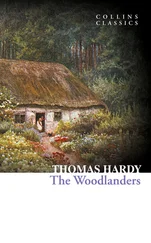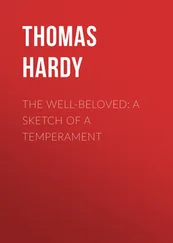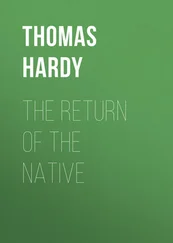Jude and Sue started as he mechanically replied in the affirmative, for the voice was Arabella's.
He formally requested her to come in, and she sat down in the window bench, where they could distinctly see her outline against the light; but no characteristic that enabled them to estimate her general aspect and air. Yet something seemed to denote that she was not quite so comfortably circumstanced, nor so bouncingly attired, as she had been during Cartlett's lifetime.
The three attempted an awkward conversation about the tragedy, of which Jude had felt it to be his duty to inform her immediately, though she had never replied to his letter.
"I have just come from the cemetery," she said. "I inquired and found the child's grave. I couldn't come to the funeral—thank you for inviting me all the same. I read all about it in the papers, and I felt I wasn't wanted… No—I couldn't come to the funeral," repeated Arabella, who, seeming utterly unable to reach the ideal of a catastrophic manner, fumbled with iterations. "But I am glad I found the grave. As 'tis your trade, Jude, you'll be able to put up a handsome stone to 'em."
"I shall put up a headstone," said Jude drearily.
"He was my child, and naturally I feel for him."
"I hope so. We all did."
"The others that weren't mine I didn't feel so much for, as was natural."
"Of course."
A sigh came from the dark corner where Sue sat.
"I had often wished I had mine with me," continued Mrs. Cartlett. "Perhaps 'twouldn't have happened then! But of course I didn't wish to take him away from your wife."
"I am not his wife," came from Sue.
The unexpectedness of her words struck Jude silent.
"Oh, I beg your pardon, I'm sure," said Arabella. "I thought you were!"
Jude had known from the quality of Sue's tone that her new and transcendental views lurked in her words; but all except their obvious meaning was, naturally, missed by Arabella. The latter, after evincing that she was struck by Sue's avowal, recovered herself, and went on to talk with placid bluntness about "her" boy, for whom, though in his lifetime she had shown no care at all, she now exhibited a ceremonial mournfulness that was apparently sustaining to the conscience. She alluded to the past, and in making some remark appealed again to Sue. There was no answer: Sue had invisibly left the room.
"She said she was not your wife?" resumed Arabella in another voice. "Why should she do that?"
"I cannot inform you," said Jude shortly.
"She is, isn't she? She once told me so."
"I don't criticize what she says."
"Ah—I see! Well, my time is up. I am staying here to-night, and thought I could do no less than call, after our mutual affliction. I am sleeping at the place where I used to be barmaid, and to-morrow I go back to Alfredston. Father is come home again, and I am living with him."
"He has returned from Australia?" said Jude with languid curiosity.
"Yes. Couldn't get on there. Had a rough time of it. Mother died of dys—what do you call it—in the hot weather, and Father and two of the young ones have just got back. He has got a cottage near the old place, and for the present I am keeping house for him."
Jude's former wife had maintained a stereotyped manner of strict good breeding even now that Sue was gone, and limited her stay to a number of minutes that should accord with the highest respectability. When she had departed Jude, much relieved, went to the stairs and called Sue—feeling anxious as to what had become of her.
There was no answer, and the carpenter who kept the lodgings said she had not come in. Jude was puzzled, and became quite alarmed at her absence, for the hour was growing late. The carpenter called his wife, who conjectured that Sue might have gone to St. Silas' church, as she often went there.
"Surely not at this time o' night?" said Jude. "It is shut."
"She knows somebody who keeps the key, and she has it whenever she wants it."
"How long has she been going on with this?"
"Oh, some few weeks, I think."
Jude went vaguely in the direction of the church, which he had never once approached since he lived out that way years before, when his young opinions were more mystical than they were now. The spot was deserted, but the door was certainly unfastened; he lifted the latch without noise, and pushing to the door behind him, stood absolutely still inside. The prevalent silence seemed to contain a faint sound, explicable as a breathing, or a sobbing, which came from the other end of the building. The floor-cloth deadened his footsteps as he moved in that direction through the obscurity, which was broken only by the faintest reflected night-light from without.
High overhead, above the chancel steps, Jude could discern a huge, solidly constructed Latin cross—as large, probably, as the original it was designed to commemorate. It seemed to be suspended in the air by invisible wires; it was set with large jewels, which faintly glimmered in some weak ray caught from outside, as the cross swayed to and fro in a silent and scarcely perceptible motion. Underneath, upon the floor, lay what appeared to be a heap of black clothes, and from this was repeated the sobbing that he had heard before. It was his Sue's form, prostrate on the paving.
"Sue!" he whispered.
Something white disclosed itself; she had turned up her face.
"What—do you want with me here, Jude?" she said almost sharply. "You shouldn't come! I wanted to be alone! Why did you intrude here?"
"How can you ask!" he retorted in quick reproach, for his full heart was wounded to its centre at this attitude of hers towards him. "Why do I come? Who has a right to come, I should like to know, if I have not! I, who love you better than my own self—better—far better—than you have loved me! What made you leave me to come here alone?"
"Don't criticize me, Jude—I can't bear it!—I have often told you so. You must take me as I am. I am a wretch—broken by my distractions! I couldn't bear it when Arabella came—I felt so utterly miserable I had to come away. She seems to be your wife still, and Richard to be my husband!"
"But they are nothing to us!"
"Yes, dear friend, they are. I see marriage differently now. My babies have been taken from me to show me this! Arabella's child killing mine was a judgement—the right slaying the wrong. What, shall I do! I am such a vile creature—too worthless to mix with ordinary human beings!"
"This is terrible!" said Jude, verging on tears. "It is monstrous and unnatural for you to be so remorseful when you have done no wrong!"
"Ah—you don't know my badness!"
He returned vehemently: "I do! Every atom and dreg of it! You make me hate Christianity, or mysticism, or Sacerdotalism, or whatever it may be called, if it's that which has caused this deterioration in you. That a woman-poet, a woman-seer, a woman whose soul shone like a diamond—whom all the wise of the world would have been proud of, if they could have known you—should degrade herself like this! I am glad I had nothing to do with Divinity—damn glad—if it's going to ruin you in this way!"
"You are angry, Jude, and unkind to me, and don't see how things are."
"Then come along home with me, dearest, and perhaps I shall. I am overburdened—and you, too, are unhinged just now." He put his arm round her and lifted her; but though she came, she preferred to walk without his support.
"I don't dislike you, Jude," she said in a sweet and imploring voice. "I love you as much as ever! Only—I ought not to love you—any more. Oh I must not any more!"
"I can't own it."
"But I have made up my mind that I am not your wife! I belong to him—I sacramentally joined myself to him for life. Nothing can alter it!"
"But surely we are man and wife, if ever two people were in this world? Nature's own marriage it is, unquestionably!"
Читать дальше












